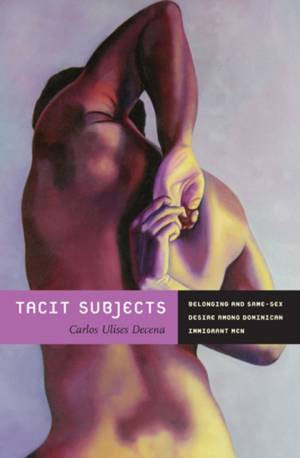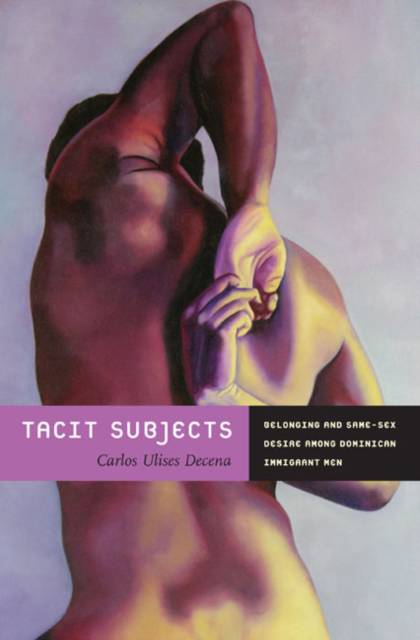
- Afhalen na 1 uur in een winkel met voorraad
- Gratis thuislevering in België vanaf € 30
- Ruim aanbod met 7 miljoen producten
- Afhalen na 1 uur in een winkel met voorraad
- Gratis thuislevering in België vanaf € 30
- Ruim aanbod met 7 miljoen producten
Zoeken
Tacit Subjects
Belonging and Same-Sex Desire among Dominican Immigrant Men
Carlos Ulises Decena
Paperback | Engels
€ 56,45
+ 112 punten
Omschrijving
Tacit Subjects is a pioneering analysis of how gay immigrant men of color negotiate race, sexuality, and power in their daily lives. Drawing on ethnographic research with Dominicans in New York City, Carlos Ulises Decena explains that while the men who shared their life stories with him may self-identify as gay, they are not the liberated figures of traditional gay migration narratives. Decena contends that in migrating to Washington Heights, a Dominican enclave in New York, these men moved from one site to another within an increasingly transnational Dominican society. Many of them migrated and survived through the resources of their families and broader communities. Explicit acknowledgment or discussion of their homosexuality might rupture these crucial social and familial bonds. Yet some of Decena's informants were sure that their sexuality was tacitly understood by their family members or others close to them. Analyzing their recollections about migration, settlement, masculinity, sex, and return trips to the Dominican Republic, Decena describes how the men at the center of Tacit Subjects contest, reproduce, and reformulate Dominican identity in New York. Their stories reveal how differences in class, race, and education shape their relations with fellow Dominicans. They also offer a view of "gay New York" that foregrounds the struggles for respect, belonging, and survival within a particular immigrant community.
Specificaties
Betrokkenen
- Auteur(s):
- Uitgeverij:
Inhoud
- Aantal bladzijden:
- 328
- Taal:
- Engels
Eigenschappen
- Productcode (EAN):
- 9780822349457
- Verschijningsdatum:
- 16/02/2011
- Uitvoering:
- Paperback
- Formaat:
- Trade paperback (VS)
- Afmetingen:
- 158 mm x 234 mm
- Gewicht:
- 471 g

Alleen bij Standaard Boekhandel
+ 112 punten op je klantenkaart van Standaard Boekhandel
Beoordelingen
We publiceren alleen reviews die voldoen aan de voorwaarden voor reviews. Bekijk onze voorwaarden voor reviews.











